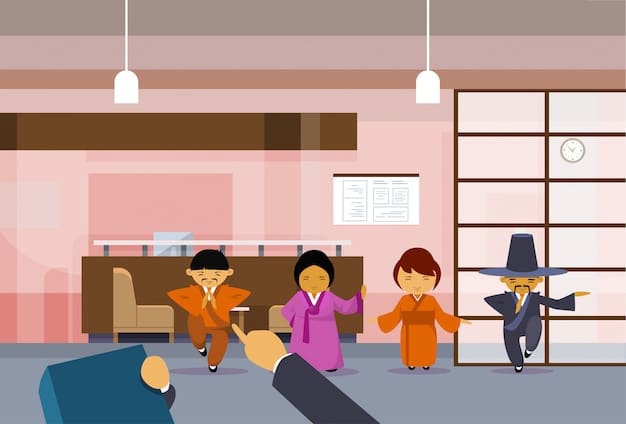The Rise of Salaryman Dramas: Social Commentary in Japanese TV

Salaryman dramas in Japan have risen in popularity, offering a critical lens into the lives, struggles, and societal pressures faced by the everyday office worker, reflecting broader social issues and cultural values.
The world of Japanese drama, or J-drama, has captured the hearts of audiences worldwide, but few genres offer as poignant and insightful a view of Japanese society as the salaryman drama. These shows, which chronicle the lives of Japanese office workers, or salarymen, have become increasingly popular, offering a critical lens into the struggles, triumphs, and everyday realities of these individuals.
The Evolution of the Salaryman in Japanese Culture
The salaryman is more than just an office worker; he is an icon of post-war Japan, embodying the country’s work ethic and economic miracle. Understanding the historical context of the salaryman is crucial to appreciating the depth and nuance of salaryman dramas. The evolution from the post-war era to the modern-day salaryman reflects significant shifts in Japan’s economic and social landscape.
Post-War Boom and the Rise of the Salaryman
During the post-war period, the salaryman emerged as a central figure in Japan’s rapid economic growth. These individuals were the backbone of large corporations, dedicating their lives to their companies. The idea of lifetime employment (終身雇用, shūshin koyō) became a norm, fostering loyalty and commitment.
Modern Challenges and Changing Expectations
In recent decades, the traditional model of the salaryman has faced numerous challenges. Economic stagnation, globalization, and changing societal values have led to increased job insecurity, longer working hours, and heightened stress levels. Modern salaryman dramas often reflect these evolving realities, depicting the struggles of younger generations grappling with these challenges.
- Economic Stagnation: The bursting of Japan’s economic bubble in the 1990s led to a prolonged period of stagnation, impacting job security and career prospects for salarymen.
- Globalization: The need to compete in a global market has intensified work pressures and introduced new management styles, often clashing with traditional Japanese practices.
- Changing Values: Younger generations are increasingly questioning the traditional commitment to lifelong employment, seeking better work-life balance and personal fulfillment.
The salaryman persona has evolved from being a symbol of economic success to a reflection of modern-day challenges in Japan. These dramas offer a poignant insight into these changing dynamics. By understanding this evolution, we can better appreciate the commentary these dramas provide, reflecting the broader shifts occurring within Japanese society.
Common Themes and Tropes in Salaryman Dramas
Salaryman dramas explore a range of themes and tropes that reflect the realities of corporate life in Japan. These narratives often delve into issues of overwork, power dynamics, and the search for meaning and identity within a highly structured environment. Identifying these recurring themes helps in understanding the critical messages these dramas convey.

Overwork and Burnout
One of the most prominent themes in salaryman dramas is the issue of overwork and burnout. Many dramas depict the long hours, demanding workloads, and constant pressure faced by salarymen, which often lead to physical and mental exhaustion. This theme highlights the pervasive culture of presenteeism and the expectation of unwavering commitment to the company.
Power Harassment (パワハラ, Pawahara)
Power harassment, or “pawahara,” is another common trope explored in these dramas. It involves the abuse of authority by superiors, leading to emotional distress and professional setbacks for subordinates. Salaryman dramas often shed light on the prevalence of pawahara in Japanese workplaces and its detrimental effects on employees’ well-being.
- Workplace Bullying: Depictions often include instances of direct bullying, intimidation, and public humiliation.
- Unrealistic Expectations: Portrayals of managers setting impossible goals and timelines, leading to undue stress on employees.
- Lack of Support: The absence of adequate support systems within the workplace, leaving victims of harassment feeling isolated and helpless.
Salaryman dramas often use these themes to challenge the norms of Japanese corporate culture, encouraging audiences to reflect on the human cost of prioritizing work over personal well-being. By exploring these themes, the dramas advocate for a more balanced and humane approach to work, making them both relatable and thought-provoking.
Notable Salaryman Dramas and Their Social Impact
Several salaryman dramas have gained widespread acclaim for their insightful portrayal of Japanese corporate life and their social impact. These dramas not only entertain but also provoke important conversations about work culture, societal expectations, and individual agency. Examining a few notable examples illustrates how these dramas shape public perception.
Hanzawa Naoki (半沢直樹)
Hanzawa Naoki is one of the most popular salaryman dramas in recent history. The series follows the story of Naoki Hanzawa, a banker who navigates the treacherous world of corporate finance while seeking justice against corrupt superiors. Its success lies in its portrayal of a protagonist who dares to challenge the status quo.
Shima Kōsaku (島耕作)
Shima Kōsaku, based on the manga series of the same name, offers a long-running narrative of a salaryman’s journey through the ranks of a major corporation. The series depicts the political maneuvering, ethical dilemmas, and personal sacrifices involved in climbing the corporate ladder. It provides a comprehensive view of the salaryman’s life, from junior employee to executive.

- Public Discourse: The popularity of these dramas has sparked public discourse about issues such as work-life balance, ethical conduct, and the treatment of employees.
- Workplace Reforms: Some companies have reportedly taken steps to address the issues raised in these dramas, such as reducing working hours, implementing anti-harassment policies, and promoting a more supportive work environment.
- Employee Empowerment: By portraying characters who stand up against injustice, these dramas inspire viewers to assert their rights and advocate for positive change in their own workplaces.
These dramas highlight the social impact of salaryman dramas and show the shows’ influence in society. They do more than just entertain by providing insights into the complex issues and influencing real-world change by encouraging people to question and improve their work lives.
The Salaryman’s Wife: A Different Perspective
While salaryman dramas primarily focus on the male perspective, some narratives explore the lives and struggles of the salaryman’s wife (専業主婦, senkyo shufu). These storylines offer a different angle on the social commentary, highlighting the expectations placed on women to support their husbands’ careers while managing the household and raising children.
Traditional Roles and Expectations
The traditional role of the salaryman’s wife involves managing the household, raising children, and providing emotional support to her husband. She is expected to create a stable home environment that allows him to focus on his career. This role often comes with its own set of challenges, including social isolation, financial dependence, and limited opportunities for personal fulfillment.
Modern Challenges and Changing Dynamics
As societal values evolve, many salaryman wives are seeking greater autonomy and independence. Some choose to pursue their own careers, while others engage in volunteer work or community activities. These modern narratives challenge the traditional expectations and highlight the diverse experiences of women in contemporary Japan.
- Dual-Income Households: The rise of dual-income households reflects changing attitudes towards women’s roles in the workplace and the need for financial stability.
- Work-Life Balance: Many salaryman wives struggle to balance their responsibilities at home with their professional aspirations.
- Social Support: The availability of social support networks and childcare facilities plays a crucial role in enabling women to pursue their careers and achieve a better work-life balance.
Exploring the perspective of the salaryman’s wife adds depth to the social commentary in salaryman dramas, revealing the complex interplay of gender roles, societal expectations, and personal aspirations. By portraying these characters with empathy and nuance, these dramas encourage viewers to reflect on the challenges faced by women in contemporary Japan, the expectations placed upon them and how they find meaning outside of these expectations.
The Future of Salaryman Dramas: Adapting to Modern Times
As Japan continues to evolve, salaryman dramas are adapting to reflect modern realities and emerging social issues. New narratives are exploring themes such as diversity, mental health, and the impact of technology on the workplace. These dramas provide insights into the changing nature of work and the challenges faced by future generations.
Diversity and Inclusion
Modern salaryman dramas are increasingly featuring diverse characters, including women in leadership positions, individuals from marginalized communities, and foreign workers. These narratives challenge traditional stereotypes and promote greater inclusivity in the workplace. By showcasing diverse perspectives, these dramas enrich the social commentary and resonate with a broader audience.
Mental Health Awareness
With growing awareness of mental health issues, salaryman dramas are addressing topics such as stress, anxiety, and depression. These dramas often depict characters seeking professional help, practicing self-care, and advocating for mental health support in the workplace. Such narratives help destigmatize mental illness and encourage viewers to prioritize their well-being.
- Telecommuting: Dramas explore challenges and opportunities of remote work, including isolation, blurred work-life boundaries, and the need for digital communication skills.
- Automation: Portrayals of automation and AI in the workplace, raising questions about the future of work, job security, and the need.
- Social Media: Depictions of social media’s impact on workplace dynamics, including online harassment, privacy concerns, and the use of social media for professional networking.
As salaryman dramas continue to evolve, they will remain a powerful medium for exploring the complexities of Japanese society and the changing nature of work. By addressing contemporary issues and showcasing diverse perspectives, these dramas will continue to engage and inspire audiences, influencing cultural norms and promoting positive change. The future of salaryman dramas lies in their ability to stay relevant, thought-provoking, and insightful.
The Global Appeal of Salaryman Dramas
Despite their focus on Japanese corporate culture, salaryman dramas have gained a global following. Their universal themes of ambition, struggle, and human connection resonate with audiences around the world. Exploring the reasons behind their global appeal can provide insights into the power of these narratives.
Relatable Themes
Many of the challenges faced by salarymen, such as overwork, workplace politics, and the search for meaning, are universal experiences that transcend cultural boundaries. Audiences from different countries can relate to these themes, finding comfort and inspiration in the characters’ struggles and triumphs. The relatable nature of these dramas contributes to their widespread appeal.
Cultural Insights
Salaryman dramas offer a unique window into Japanese culture, providing viewers with insights into the values, customs, and social norms that shape Japanese society. These dramas can be fascinating and educational, sparking curiosity and appreciation for Japanese culture. The cultural insights provided by these dramas enhance their global appeal.
- Streaming Platforms: Availability on streaming platforms like Netflix and Crunchyroll has expanded the reach, making them accessible to global audiences.
- Subtitles and Dubbing: High-quality subtitles and dubbing enable international viewers to understand the nuances of the language and culture.
- Social Media: Social media platforms facilitate discussions and recommendations, helping these dramas gain visibility and attract new audiences.
The global appeal of salaryman dramas lies in their ability to tell compelling stories that resonate with audiences from diverse backgrounds. By exploring universal themes, providing cultural insights and leveraging digital platforms, these dramas have captivated viewers around the world, showcasing the power of storytelling to bridge cultural gaps and foster empathy. These are ultimately human stories about how we interact with each other.
| Key Point | Brief Description |
|---|---|
| 🏢 Salaryman Evolution | From post-war icon to symbol of modern struggles. |
| 💼 Overwork & Burnout | Common themes reflecting workplace pressures. |
| 🎬 Notable Dramas | Series like “Hanzawa Naoki” & social impact. |
| 🌍 Global Appeal | Relatable themes & cultural insights. |
Frequently Asked Questions
▼
A salaryman drama is a subgenre of Japanese television drama (J-drama) that focuses on the lives, struggles, and triumphs of Japanese office workers, often exploring themes of corporate culture, work-life balance, and societal expectations. These dramas provide a critical commentary on the realities of working life in Japan.
▼
They are popular in Japan because they mirror the daily experiences of many Japanese workers. They are able to connect with the viewers and tap into common frustrations, ambitions, and anxieties. The shows provide people with the sense that they are not alone in their life choices.
▼
Although the shows may tackle serious issues, some salaryman dramas can have positive outcomes that focus on the characters’ growth and development. However, other dramas display a more realistic point of view that can lead to a more bittersweet or mixed ending, that gives a deeper insight.
▼
Although the dramas may be set in the workplace of Japan, lots of the issues that salaryman dramas explore like overwork, workplace politics, pressure for success and social issues have a resonance with viewers from other countries providing insight into this culture.
▼
They reflect values like harmony, respect, honor, and the need for devotion. The characters work as a way to show the values. This allows viewers to see the inner workings of society alongside having a clearer perspective on values.
Conclusion
In conclusion, salaryman dramas offer a compelling reflection of Japanese corporate life and society. Through their exploration of overwork, power dynamics, gender roles, and modern challenges, these dramas provide valuable insights into the lives of Japanese office workers. Their global appeal lies in their relatable themes and cultural insights, making them a powerful medium for storytelling and social commentary.





